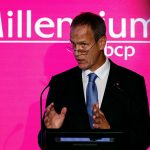OutSystems aims for 60% subscription growth while doubling staff in 2019
The CEO of OutSystems, one of Portugal’s biggest technology start-ups, is confident of retaining its leading position in the fast-growing market for applications built with minimal coding after receiving $360 million in funding this year.
“When we got the funding, it kind of delayed the pressure for an IPO, so a lot of the decisions we are making today are medium-to long-term decisions to make sure we become a many, many billion-dollar company,” founder Paulo Rosado said at the Web Summit in Lisbon.
The funding has renewed attention on Portugal’s growing tech scene as it shows there are more so-called unicorns, or start-up companies valued above $1 billion, in the country after online retailer Farfetch launched an IPO abroad this summer.
OutSystems, which operates in more than 50 countries and runs a platform allowing software developers to build web and mobile applications without traditional coding, announced the investment from U.S. firm KKR and Goldman Sachs in June.
“It’s going exactly as planned,” Paulo Rosado told Reuters at the Web Summit when asked about the company’s expansion plans after the funding.
“Our perspective has always been 60 percent subscription growth. We’ve managed to hit those targets,” he said, predicting that the niche market OutSystems serves could be worth $20 billion in future. “The potential of the market is huge.”
Rosado said the investment had allowed OutSystems to focus on expanding rapidly, including in the U.S., the company’s fastest growing market from which it generates most of its $100 million revenues.
OutSystems offers companies who do not have in-house developers, or who can’t outsource development because of intellectual property concerns, a way to build applications such as geolocation, contact lists or cameras.
Rosado explained that the fast growing demand for OutSystems’ platform is further supported by the fact that software is becoming more complex as technological change accelerates.
OutSystems will nearly double its staff to 1,050 next year. About half its employees are in Portugal, where it has its engineering and R&D units.










